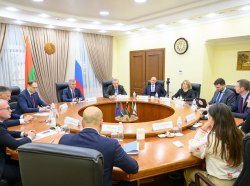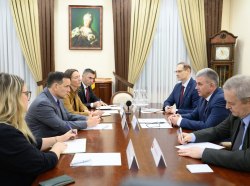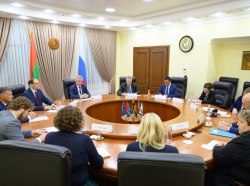Tiraspol, 15 June. /Novosti Pridnestrovya/. Kishinev's OSCE Mission hosted a regular meeting of Pridnestrovian and Moldovan expert (working) groups on ecology with the involvement of representatives of the observers and mediators.
According to the press service of Pridnestovie's MFA, a protocol of cooperation in the sphere of fisheries management and the rational use of the biological resources of the Dniester River was signed following the meeting. Thus, the sides have performed Article 4 of the Protocol on the results of the «Permanent Conference…” meeting, which took place on 2−3 June in Berlin.
According to a deputy minister of agriculture and natural resources of the PMR, Yelena Nezhinskaya, the protocol signed in Kishinev today lays down the rules and terms of information exchange between relevant agencies in Moldova and Pridnestrovie on the use of the Dniester’s biological resources.
«We must know what actions are carried out, we must be aware of seeding procedures, how they determine the species composition of water reservoirs because we cannot take any prompt measures without this information," said the deputy minister in an interview with Novosti Pridnestrovya.
The protocol provides, among other things, for cooperation of the sides in the area of fisheries control and enforcement. «Our agencies must cooperate in this sphere to have a common understanding," said Yelena Nezhinskaya. According to her, earlier because of differences in Moldova's and Pridnestrovie's legislation there were cases when Moldova's control agencies detained Pridnestrovian anglers fishing in full compliance with the PMR's legislation. And on the contrary, Moldovan poachers used to hide from Pridnestrovie's control authorities in Moldova.
This document is supposed to minimise the occurrence of such incidents and provide the possibility of bringing the poacher to account, regardless of the territory he is in.
According to Yelena Nezhinskaya, in addition to information exchange and fisheries control, Moldova and Pridnestrovie will have to fulfil a considerable amount of work to establish cooperation in other areas related to the Dniester's ecology.
«We need to study the legislation of both countries, set a common period of fishing prohibition and settle other issues," explained the deputy minister. This document, according to Yelena Nezhinskaya, will serve as a road map for establishing further cooperation in this sphere.








